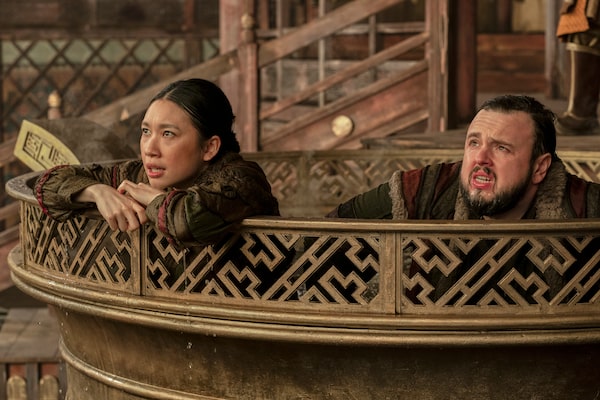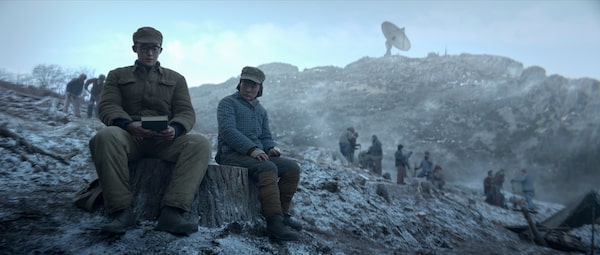The new Netflix series 3 Body Problem, from the creators of Game of Thrones, is some seriously scintillating science fiction – for a little over half of its eight-episode season, anyway.
This TV adaptation of Chinese writer Liu Cixin’s Hugo Award-winning novel about an extremely slow-motion alien invasion – when humanity catches on they’re coming, they’re still 400 Earth years away – eventually runs into problems beyond the unsolvable physics one referenced in the title.
Though perhaps the storyline issues are actually linked to that scientific one, about being unable to figure out the trajectories of multiple moving objects attracted to one another.
How Chinese science fiction went from underground magazines to Netflix extravaganza
Showrunners David Benioff and D.B. Weiss, the Game of Thrones veterans, and new collaborator Alexander Woo certainly have trouble credibly depicting a love triangle they’ve shoehorned into the plot. And eventually they start to struggle to keep a number of other narrative balls up in the air, too.
But if your favourite kind of screen sci-fi is the thoughtful variety represented by films such as Contact and Arrival, you’ll be over the moon for much of the series.
The action begins in Beijing in 1966 during the Cultural Revolution, as young astrophysicist Ye Wenjie (Zine Tseng; later played as an older woman by Rosalind Chao) watches her professor father be beaten to death during a struggle session designed to “root out the bugs.” His thought crime: believing in the theory of relativity.
Flash forward to present day London, where scientists keep dying – mainly by suicide after dramatically losing their belief in physics. One ends it all by clawing out his own eyes like Oedipus.
Da Shi (the great Benedict Wong, freed from the Marvel machine), an investigator for some shadowy all-seeing police force, is looking into these deaths – and quickly ends up crossing paths with a group of young scientists who have reunited for the funeral of their mentor, who took a flying leap into a particle accelerator.
The Oxford Five, as the photogenic brainiacs are known, are the single protagonist of Cixin’s novel split into many.
Three are at the top of their professions: Jin (the hugely talented Jess Hong), a theoretical physicist with a empathetic streak; Auggie (Eiza González), a too-cool-for-school nanotech entrepreneur on the verge of a major breakthrough; and Jack (John Bradley), a goofy multimillionaire who left science and built a snack-food empire.

Jess Hong as Jin Cheng and John Bradley as Jack Rooney in an episode of 3 Body Problem on Netflix.Ed Miller/Netflix
The other two of the five haven’t lived up to their potential in the same way: Will (Alex Sharp) is a high-school teacher, now hiding a terminal cancer diagnosis, while Saul (Jovan Adepo), described by all parties as the smartest of the bunch, is wasting his time smoking pot and having sex.
Quickly, things get weird for the successful ones as some unseen force tries to eliminate them or recruit them to their cause. Auggie starts to hallucinate a countdown clock in front of her eyes and encounters a mysterious cult member who warns her to shut down her research if she doesn’t want to end up blinded by science.
Meanwhile, Jin and Jack are recipients of a pair of next-next-next-gen VR helmets that also cropped up at some scientist suicide sites. They get pulled into an adventure game set on another planet that is constantly being pulled into or away from a sun, leading to the local population’s grisly demise.
In depicting this video game, 3 Body Problem’s directors – starting with Derek Tsang and ending with Canadian Thrones vet Jeremy Podeswa – get wildly creative, showing humans dehydrated and then rolled up for safe-keeping, or an army of 13 million soldiers holding signs to become the bits and bytes of a human computer. (It’s enjoyable, too, to find literary references in the visuals, such as the beautiful conjuring of the “sunny pleasure-dome” described by Samuel Taylor Coleridge in his poem Kubla Khan.)
There’s a series of puzzles to be solved in the plot that eventually link up to a message that Ye Wenjie sent off into the universe more than half a century earlier after having her close encounter with human cruelty. And these puzzles do get solved in a satisfying manner, just perhaps a little too early in the season.
Indeed, after its most shocking and stunning scene, set at the Panama Canal, 3 Body Problem has to reach into the second book in Cixin’s series to ramp up tension again for the season finale.

Yang Hewen as Bai Mulin and Zine Tseng as Young Ye Wenjie in 3 Body Problem.Netflix
But what keeps 3 Body Problem from truly blasting into space are the aforementioned human problems.
In transforming a single scientist into a quintet, the creators have set up a situation where they can credibly threaten to kill any of them at any moment – as was their wont in Game of Thrones – but the interpersonal drama between the characters rarely feels fully fleshed out.
The friendships consist mostly of banter that only Hong, who seems capable of acting anything, and Bradley, who provides expert comic relief, are truly able to pull off. The shoddily structure central romantic triangle culminates in a moment that was supposed to be heartbreaking but made me bust a gut.
As the narrative gets glitchy, it’s hard to keep overlooking issues such as González’s glazed-over pose of a performance as Auggie, which hits the same superficial note over and over even as her ethical dilemmas deepen.
I keep seeing The Three-Body Problem, the book, described as “unadaptable,” but in fact Cixin’s books have previously been turned into a Mandarin radio drama and a 30-episode TV series that premiered in China last year.
You can watch Three-Body, as that more true-to-the-book version is called, with English subtitles on the free, ad-supported streaming service Rakuten Viki in Canada. I checked out the first episode and, while it had its moments, it also had too many musical montages of scientists staring out the window for my tastes. It quickly had me pining for a second season of the Netflix version.
 J. Kelly Nestruck
J. Kelly Nestruck